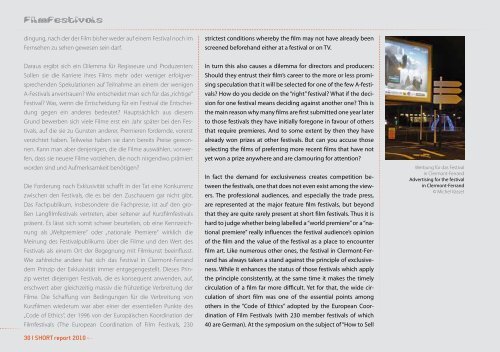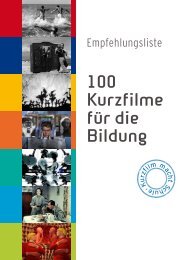short report - AG Kurzfilm
short report - AG Kurzfilm
short report - AG Kurzfilm
Sie wollen auch ein ePaper? Erhöhen Sie die Reichweite Ihrer Titel.
YUMPU macht aus Druck-PDFs automatisch weboptimierte ePaper, die Google liebt.
Filmfestivals<br />
dingung, nach der der Film bisher weder auf einem Festival noch im<br />
Fernsehen zu sehen gewesen sein darf.<br />
Daraus ergibt sich ein Dilemma für Regisseure und Produzenten:<br />
Sollen sie die Karriere ihres Films mehr oder weniger erfolgversprechenden<br />
Spekulationen auf Teilnahme an einem der wenigen<br />
A-Festivals anvertrauen? Wie entscheidet man sich für das „richtige“<br />
Festival? Was, wenn die Entscheidung für ein Festival die Entscheidung<br />
gegen ein anderes bedeutet? Hauptsächlich aus diesem<br />
Grund bewerben sich viele Filme erst ein Jahr später bei den Festivals,<br />
auf die sie zu Gunsten anderer, Premieren fordernde, vorerst<br />
verzichtet haben. Teilweise haben sie dann bereits Preise gewonnen.<br />
Kann man aber denjenigen, die die Filme auswählen, vorwerfen,<br />
dass sie neuere Filme vorziehen, die noch nirgendwo prämiert<br />
worden sind und Aufmerksamkeit benötigen?<br />
Die Forderung nach Exklusivität schafft in der Tat eine Konkurrenz<br />
zwischen den Festivals, die es bei den Zuschauern gar nicht gibt.<br />
Das Fachpublikum, insbesondere die Fachpresse, ist auf den großen<br />
Langfilmfestivals vertreten, aber seltener auf <strong>Kurzfilm</strong>festivals<br />
präsent. Es lässt sich somit schwer beurteilen, ob eine Kennzeichnung<br />
als „Weltpremiere“ oder „nationale Premiere“ wirklich die<br />
Meinung des Festivalpublikums über die Filme und den Wert des<br />
Festivals als einem Ort der Begegnung mit Filmkunst beeinflusst.<br />
Wie zahlreiche andere hat sich das Festival in Clermont-Ferrand<br />
dem Prinzip der Exklusivität immer entgegengestellt. Dieses Prinzip<br />
wertet diejenigen Festivals, die es konsequent anwenden, auf,<br />
erschwert aber gleichzeitig massiv die frühzeitige Verbreitung der<br />
Filme. Die Schaffung von Bedingungen für die Verbreitung von<br />
<strong>Kurzfilm</strong>en wiederum war aber einer der essentiellen Punkte des<br />
„Code of Ethics“, der 1996 von der Europäischen Koordination der<br />
Filmfestivals (The European Coordination of Film Festivals, 230<br />
30 | ShOrT <strong>report</strong> 2010 e<br />
strictest conditions whereby the film may not have already been<br />
screened beforehand either at a festival or on TV.<br />
In turn this also causes a dilemma for directors and producers:<br />
Should they entrust their film’s career to the more or less promising<br />
speculation that it will be selected for one of the few A-festivals?<br />
How do you decide on the “right” festival? What if the decision<br />
for one festival means deciding against another one? This is<br />
the main reason why many films are first submitted one year later<br />
to those festivals they have initially foregone in favour of others<br />
that require premieres. And to some extent by then they have<br />
already won prizes at other festivals. But can you accuse those<br />
selecting the films of preferring more recent films that have not<br />
yet won a prize anywhere and are clamouring for attention?<br />
In fact the demand for exclusiveness creates competition between<br />
the festivals, one that does not even exist among the viewers.<br />
The professional audiences, and especially the trade press,<br />
are represented at the major feature film festivals, but beyond<br />
that they are quite rarely present at <strong>short</strong> film festivals. Thus it is<br />
hard to judge whether being labelled a “world premiere” or a “national<br />
premiere” really influences the festival audience’s opinion<br />
of the film and the value of the festival as a place to encounter<br />
film art. Like numerous other ones, the festival in clermont-Ferrand<br />
has always taken a stand against the principle of exclusiveness.<br />
While it enhances the status of those festivals which apply<br />
the principle consistently, at the same time it makes the timely<br />
circulation of a film far more difficult. Yet for that, the wide circulation<br />
of <strong>short</strong> film was one of the essential points among<br />
others in the “code of Ethics” adopted by the European coordination<br />
of Film Festivals (with 230 member festivals of which<br />
40 are German). At the symposium on the subject of “How to Sell<br />
Werbung für das Festival<br />
in Clermont-Ferrand<br />
Advertising for the festival<br />
in clermont-Ferrand<br />
© Michel Vasset













